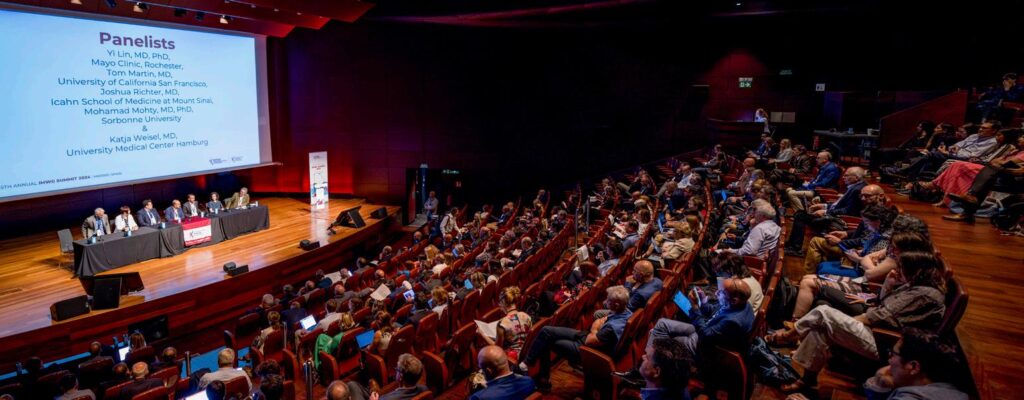As the week draws to a close, several important developments and news stories have emerged—both positive and concerning—that the myeloma community should pay close attention to.
FDA Approval of Tecvayli
On Wednesday, October 25, 2022; Janssen Pharmaceutical Companies of Johnson & Johnson (J&J) announced that the FDA has approved Tecvayli™ (teclistamab-cqyv) for the treatment of adult patients with relapsed or refractory multiple myeloma who have previously received four or more lines of therapy, including a proteasome inhibitor, immunomodulatory drug, and anti-CD38 monoclonal antibody, as per J&J’s press release.
Tecvayli is a first-in-class bispecific T-cell engager antibody, administered subcutaneously on an ongoing basis. It’s exciting to have a new, powerful immune therapy added to the myeloma treatment arsenal, particularly one that is “off-the-shelf” and readily accessible to patients.
This approval is based on findings from the MajesTEC-1 trial:
The pivotal Phase 2 MajesTEC-1 clinical trial involved patients who had undergone a median of five prior lines of therapy (n=110). The overall response rate (ORR) was 61.8%, with 28.2% of patients achieving a complete or stringent complete response (CR/sCR). The median time to first response was 1.2 months, and at six months, the estimated duration of response (DOR) rate was 90.6%. These patients were heavily pretreated, with 78% having received four or more prior therapies and 76% classified as triple-class refractory.
Unlike CAR T-cell therapies, which require weeks to prepare engineered cells and often require bridging therapy to control myeloma, Tecvayli can be administered immediately to eligible patients. This immediate access is invaluable, especially with the current limited availability of CAR T-cell treatments.
As the third immune therapy targeting B-cell maturation antigen (BCMA), following belantamab (an antibody-drug conjugate) and CAR T-cell therapies, it will be important to evaluate Tecvayli’s impact and determine the best sequence of use. The new IMWG immune therapy database registry will help monitor these developments.
For myeloma patients, particularly those in urgent need of an effective treatment, this FDA approval is a significant win. Moving forward, we hope to see even greater results by utilizing Tecvayli earlier in the disease course.
Concerning New COVID-19 Subvariants
As winter approaches, there is growing concern over a potential surge in COVID-19 cases. New subvariants of the BA.5 strain are emerging, with BQ.1, BQ.1.1, and BA 2.75.2 gaining traction, though their full impact is still being studied.
The L.A. Times reports that BQ.1.1 has grown from 0.2% of cases nationwide in mid-September to 7.2% this month, while BQ.1 increased from 0.5% to 9.4%. Another subvariant, XBB, which has been spreading in India and Singapore, has not yet been detected in the U.S., according to Business Insider.
The XBB variant is a recombinant of two BA.2 Omicron subvariants and may evade immunity from vaccines and previous infections. While we hope it doesn’t take hold, it’s important to stay informed and track COVID-19 community levels and wastewater data for early warnings.
Although COVID-19 levels remain relatively low across the U.S., myeloma patients should continue taking precautions, such as wearing high-quality masks in high-risk situations.
Good News from the Scottish Peat Bogs
As a Scotsman, I’m pleased to share positive news from Scotland’s efforts in combating climate change. Scotland’s peat bogs, vast marshlands rich in carbon-storing peat, are undergoing restoration projects to help trap carbon.
Peat bogs, largely composed of sphagnum moss, hold vast amounts of carbon that would otherwise be released when the bogs dry out. In places like Sutherland, these restoration efforts are crucial for returning water to the bogs and preventing carbon emissions. According to the BBC, peat bogs could contribute up to 30% of global carbon storage, making their preservation vital in the fight against climate change.
It’s encouraging to see my homeland making strides in addressing environmental concerns. For more information on these restoration projects, check out updates on Flow Country’s initiatives.
The Bottom Line
With so much happening in the news, it can be challenging to prioritize what’s most important. However, the FDA approval of Tecvayli is a clear victory for myeloma patients, and Scotland’s peat bog restoration offers hope in the battle against climate change. Staying informed and vigilant is always the best approach when navigating today’s complex world.



